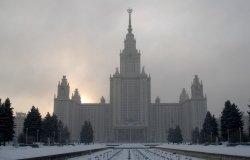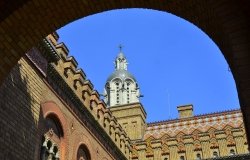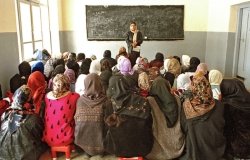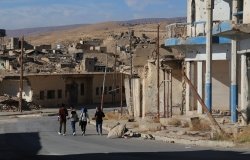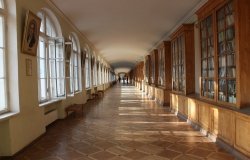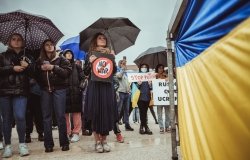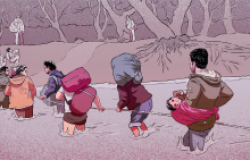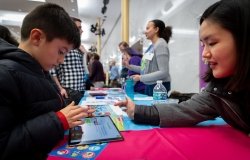Iraqi Women Leaders in Engineering and Applied Sciences
May Kassir, Lecturer, University of Technology, Baghdad; Visiting Scholar, University of California-San Diego; Mais Mohammed, Assistant Lecturer, Engineering College, University of Baghdad; Visiting Scholar, Caltech; Rawia Salih, Assistant Lecturer, College of Science, University of Baghdad; Visiting Scholar, Smith College
Overview
Three Iraqi women scientist fellows with the Iraqi Women's Fellowship Foundation (IWFF), visiting the U.S. for the 2010-2011 academic year, spoke of their experiences in the U.S. as visiting scholars, their education in Iraq, and what they hope to bring to Iraq upon their return from the United States.
On April 19, the Middle East Program and IWFF hosted a discussion on "Iraqi Women Leaders in Engineering and Applied Sciences," with May Kassir, Lecturer, University of Technology, Baghdad and Visiting Scholar, UC San Diego; Mais Mohammed, Assistant Lecturer, Engineering College, University of Baghdad and Visiting Scholar, Caltech; and Rawia Salih, Assistant Lecturer, College of Science, University of Baghdad and Visiting Scholar, Smith College. Haleh Esfandiari, Director of the Middle East Program, moderated the event. Mary Oakes Smith, President of IWFF, introduced the fellows and discussed the foundation's program which brings Iraqi women scientists as visiting scholars to universities in the United States for an academic year in order to foster collaboration and facilitate the growth of Iraqi women in the sciences.
Mohammed began the discussion, noting the growth of her department at the University of Baghdad from three academics in 2005 when the department was founded to one that now encompasses three stories and has 180 students. Despite the growth in the program, Mohammed explained the struggle faced by scientists in Iraq to secure the materials and supplies necessary to conduct research. When asked about the educational environments in the U.S and Iraq, Mohammed explained their differences and expressed an appreciation for the collaborative learning environment she has experienced while at Caltech. Mohammed continued that she hopes to bring back to Baghdad the notion of teaching as a process in which there is an active dialogue between teachers and students. While at Caltech, Mohammed formed connections with other faculty and hopes to continue collaborative research with the University upon her return to Iraq. Furthermore, she commented that she wants to facilitate a way for Iraqi women scientists to work with counterparts overseas so that those who are not able to travel internationally for familial reasons can still receive the benefits of international collaboration.
Salih discussed her desire to be a leader for her students and demonstrate that they can succeed and have an impact in a variety of disciplines. She talked about returning to Baghdad to teach and share with her students her experiences in the U.S. She discussed the Iraqi education system, explaining that college admittance and majors are determined by one's level of achievement on high school examinations. According to Salih, men are sometimes given admission preference over women for disciplines considered more important (i.e., medicine, engineering, pharmacy studies).
Kassir finished the discussion by speaking of her experiences as an industrial engineer with a specialty in waste management and factory development. While the educational system in Iraq has not experienced extensive change since the fall of Saddam Hussein in 2003, Kassir noted that the system is beginning to change, citing as an example an increased focus on applied sciences rather than solely theoretical approaches. Kassir addressed the lack of opportunities under Hussein's regime for Iraqi scientists to study and work abroad and how this has negatively affected Iraq's scientific field. Like Mohammed, Kassir noted the differences between the U.S. and Iraqi systems of education, commenting that the U.S. system is based more around teamwork and that she hopes to bring that emphasis back to her work in Baghdad.
Laura Nash, Middle East Program
Speakers
May Kassir
Mais Mohammed
Mary Oakes Smith
Rawia Salih

Haleh Esfandiari
Hosted By

Middle East Program
The Wilson Center’s Middle East Program serves as a crucial resource for the policymaking community and beyond, providing analyses and research that helps inform US foreign policymaking, stimulates public debate, and expands knowledge about issues in the wider Middle East and North Africa (MENA) region. Read more
Thank you for your interest in this event. Please send any feedback or questions to our Events staff.
